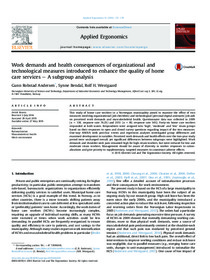Work demands and health consequences of organizational and technological measures introduced to enhance the quality of home care services: a subgroup analysis

Robstad Andersen, Gunn ; Westgaard, Rolf H. ; Bendal, Synne
2015
51
November
172-179
ergonomics ; musculoskeletal diseases ; rationalization ; work organization ; home care
Ergonomics and work environment
http://dx.doi.org/10.1016/j.apergo.2015.04.020
English
Bibliogr.
"This study of home care workers in a Norwegian municipality aimed to examine the effect of two measures involving organizational (job checklists) and technological (personal digital assistants) job aids on perceived work demands and musculoskeletal health. Questionnaire data was collected in 2009 (n = 138, response rate 76.2%) and 2011 (n = 80, response rate 54%). Forty-six home care workers responded at both waves. Respondents were assigned into ‘high', ‘moderate' and ‘low' strain groups based on their responses to open and closed survey questions regarding impact of the two measures. One-way ANOVA with post-hoc t-tests and regression analyses investigated group differences and examined development in variables. Perceived work demands and health effects over the two-year study period were unchanged overall, yet significant differences between subgroups were highlighted. Work demands and shoulder-neck pain remained high for high-strain workers, but were reduced for low and moderate strain workers. Management should be aware of diversity in worker responses to rationalizations and give priority to supplementary, targeted measures to counteract adverse effects."
Digital
The ETUI is co-funded by the European Union. Views and opinions expressed are however those of the author(s) only and do not necessarily reflect those of the European Union or the ETUI.